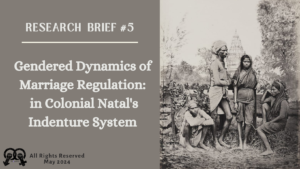ABSTRACT
This paper explores the gendered dynamics of marriage regulation within the British colonial context of Natal’s indentured system, focusing on the period from the 1860s to 1891. The paper aims to examine the complex interplay of colonial governance, societal perceptions, and gender roles in shaping marriage practices among Indian indentured labourers. Initially marked by a reluctance to interfere in Indian customs, colonial policies gradually shifted towards interventionist policies, culminating in the enactment of Law 25 of 1891. This legislation aimed to regulate Indian marriages under civil law, ostensibly to improve moral standards and align familial structures with settler norms. However, the legislative journey reflects a deeply gendered approach, perpetuating patriarchal control and inequalities within Indian communities. While ostensibly offering avenues for women to escape abusive marriages, such interventions often reinforced existing power dynamics and marginalised women’s agency. This paper aims to analyse the complexities of colonial governance, cultural autonomy, and gender dynamics inherent in the regulation of Indian marriages in Natal’s indenture system.
AUTHORED BY:
Vidarshna Mehrotra is a third-year History student at Lady Shri Ram College for Women and a Research Intern at Mandonna
EDITED BY:
Madhulina Sonowal is a third-year Political Science student at Lady Shri Ram College for Women and the Editor-in-Chief at Mandonna


